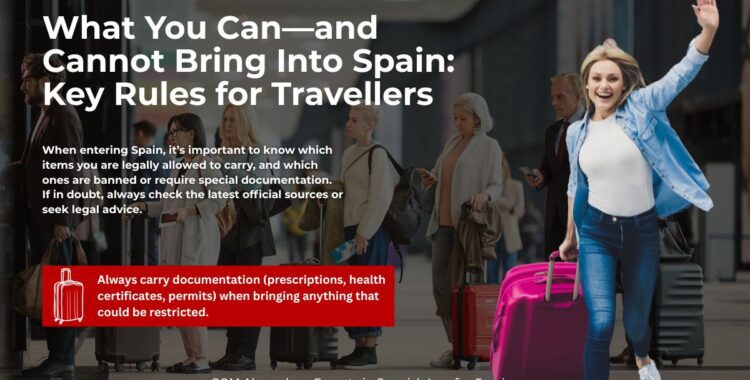What You Can and Cannot Bring Into Spain:
What Items Are Permitted—and Which Ones Are Prohibited—When Travelling to Spain
When entering Spain, it’s important to know which items you are legally allowed to carry, and which ones are banned or require special documentation. Below you’ll find a summary of Spanish and EU rules governing medicine, food products, cash, alcohol, pets, flora and fauna, weapons, and more. If in doubt, always check the latest official sources or seek legal advice.
1. Medicines
You may bring enough of your prescribed medicine for up to three months of treatment, provided you carry a valid medical prescription.
If the medicine is a controlled substance (narcotic or psychotropic), you must obtain a permit from the Spanish health authorities. Usually this involves getting written permission in advance from the relevant Spanish consulate.
2. Animal Products, Dairy & Plant Products
Travellers coming from non-EU countries are barred from bringing in meat, dairy products (such as milk, cheese), and items derived from them (for example, certain pastries, yoghurts, large blocks of cheese or cheesecakes).
Limited quantities of fruits, vegetables, eggs and egg-products, honey, fish and fish products are allowed, as are a limited quantity of powdered milk for babies or pet food.
3. Cash
If you travel with €10,000 or more (or equivalent in other currencies), declare it to customs officers. This rule applies both when entering and leaving Spain, whether you are coming from or going to EU / non-EU countries.
4. Alcohol & Tobacco
For travellers arriving from outside the EU, restrictions are stricter. Allowed amounts include, among others:
| Product | Maximum Allowance |
|---|---|
| Cigarettes | 200 |
| Cigarillos | 100 |
| Cigars | 50 |
| Tobacco (loose) | 250 g |
For alcoholic drinks:
Over 22% vol.: Up to 1 litre
Less than 22% vol.: Up to 2 litres
Wine: up to 4 litres
Beer: up to 16 litres
If arriving from another EU country, the allowances are greater. For example, up to 10 litres of spirits, 90 litres of wine (with max 60 litres being sparkling), 20 litres fortified wine, 110 litres of beer. Note: rules for the Canary Islands may differ.
Even if you do not exceed the limits, you must still declare the alcohol and tobacco you bring.
5. Personal Effects & Household Goods
If entering from a non-EU country, you may bring personal items in your luggage tax-free, so long as they are not for commercial purposes.
Value thresholds vary:
By land: up to €300 per person
By sea or air: up to €430 per person
Travellers under 15 years old: max €150 regardless of transport mode
Counterfeit items (fake designer goods, pirated media, etc.) are prohibited.
6. Flora, Fauna & Pets
Species protected under CITES cannot be imported without the required permits. This includes items like ivory, turtle shell products, certain hunting trophies, exotic birds.
Pets (dogs, cats, ferrets) arriving from within the EU need a pet passport. Travellers from non-EU countries will also need an official health certificate, showing vaccinations (especially rabies) are up to date. A new certificate may be required for each trip.
7. Weapons and Tools
Items such as firearms (revolvers, shotguns, rifles), gun replicas, air guns, axes, harpoons are not allowed without proper authorisation.
Final Recommendations
Always carry documentation (prescriptions, health certificates, permits) when bringing anything that could be restricted.
When in transition (via airports, customs, etc.), ask officials if you are unsure.
Bear in mind that rules can vary for special zones (e.g. Canary Islands) or for travel-type (by air, land, sea).
If you face a confiscation or penalty, legal assistance may help assert your rights, especially in ambiguous cases.
Even certain tools or sharp objects (knives, screwdrivers, pliers, etc.) may be regulated or prohibited depending on their nature and how you carry them.











